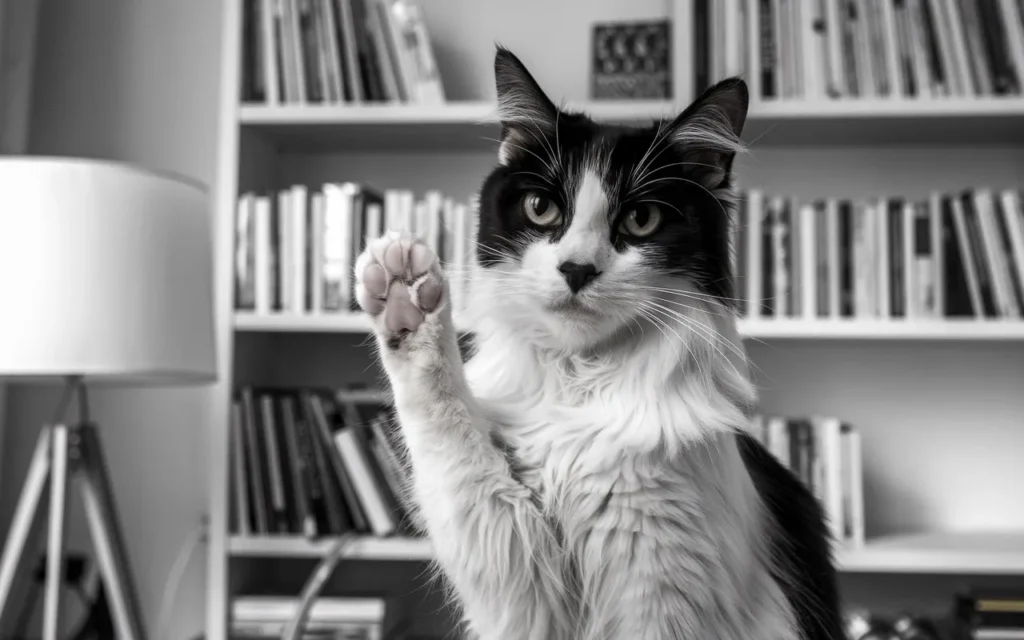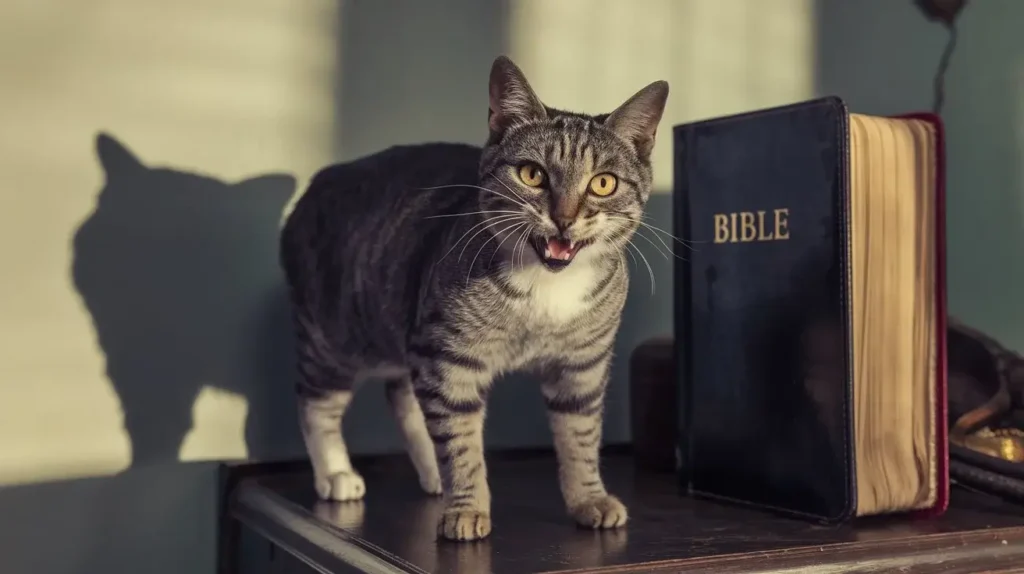introduction : are cats evil in the bible
Are cats evil in the Bible? This intriguing question has puzzled both cat lovers and biblical scholars for centuries. While many households cherish cats as beloved pets today, their status in biblical times remains a subject of debate. In this comprehensive exploration, we’ll delve into the various perspectives on cats in biblical context, examining scripture, historical evidence, and cultural interpretations to uncover the truth about felines in the holy text.
The Enigma of Cats in Biblical Times: Are Cats Evil in the Bible?
When we ask, “Are cats evil in the Bible?” It’s important to note that the Bible does not explicitly mention cats. This absence of direct references has led to numerous interpretations and speculations about their role in biblical times. To understand the perception of cats in the Bible, we need to examine the historical and cultural context of the ancient Near East.
Ancient Egypt’s Divine Cats: Influencing Biblical Perceptions?
To understand the biblical view of cats, it is necessary to turn first to the status of cats in the neighboring civilizations, especially Ancient Egypt. The Egyptians viewed cats as sacrosanct and even worshipped them; the goddess Bastet was usually depicted either as a cat or a woman with the head of a cat. Such a divine association probably prejudiced the view of cats in the biblical lands.
The Israelites and Egyptian Influences: Shaping Views on Cats
Given the Israelites’ history with Egypt, including their enslavement and eventual exodus, cats may have become associated with Egyptian paganism. This connection could have led to a negative perception of cats among the ancient Israelites, potentially influencing biblical authors.

Searching for Cats in Bible Verses: Are Cats Evil in Scripture?
While the Bible doesn’t directly mention domestic cats, some scholars have attempted to find indirect references or allusions to felines in scripture. Let’s examine some of these potential cat-related passages to answer the question: are cats evil in the Bible verse?
Isaiah 13:21-22: Wild Cats in Biblical Prophecy?
One verse often cited in discussions about cats in the Bible is Isaiah 13:21-22:
“Wild animals will inhabit the area, filling the homes with haunting noises. Ostriches will make their homes, and wild goats will leap about. Hyenas will howl from the towers, and jackals will roam the once-luxurious palaces. The end is approaching swiftly, and its time will not be extended.”
Some translations use the term “wild cats” instead of “wild animals,” leading to speculation about feline presence in biblical prophecy. However, scholars don’t universally accept this interpretation, and it depends on the specific translation used.
Baruch 6:21: Cats on Idols in Deuterocanonical Texts?
In the deuterocanonical book of Baruch, there’s a passage that some interpret as referencing cats:
“Bats, swallows, and various birds rest on their bodies and heads, along with the presence of cats.”
This verse describes animals perching on idols, potentially including cats. However, it’s important to note that not all Christian denominations consider this book part of the biblical canon.
Cultural Attitudes Towards Cats in Biblical Lands: Shaping Perceptions
To better understand the question “Are cats evil in the Bible?” We should explore the cultural perceptions of cats in the areas where the authors of the Bible lived and wrote.
Cats in Ancient Mesopotamia: Practical Pest Control
People in ancient Mesopotamia viewed cats mainly as an instrument for population control of rodents. In contrast, Egyptians would tend to look upon felines in regard to divinity status and often deify them. Such utilitarian views of cats could be mighty influences on the perception of felines in biblical lands.
Cats in Ancient Israel: Archaeological Evidence
Archaeological evidence suggests that cats lived in ancient Israel, but their status was likely more pragmatic than religious. People may have appreciated cats for their ability to control pests, but cats don’t appear to have held the same sacred status as in Egypt.
The Symbolic Meaning of Animals in the Bible: Where Do Cats Fit?
To fully explore the question “Are cats evil in the Bible?” We need to take into account that the Bible often uses animals in a symbolic manner.
Lions: Strength and Nobility in Scripture
The Bible frequently mentions lions, often symbolizing strength, nobility, and even divine power. For example, Revelation 5:5 refers to Jesus as the “Lion of Judah.”
Serpents: Cunning and Temptation in Biblical Narrative
Snakes, particularly in the story of Adam and Eve, are associated with cunning and temptation. This negative symbolism contrasts with the more positive attributes given to some other animals.
Doves: Peace and the Holy Spirit in Biblical Imagery
The Bible uses doves to represent peace and the Holy Spirit, as seen in the account of Jesus’ baptism in Matthew 3:16.
The Absence of Cats in Biblical Symbolism: What It Means
The lack of explicit cat symbolism in the Bible is notable, especially given the rich animal imagery used throughout scripture. This absence may suggest that cats didn’t hold significant symbolic meaning for the biblical authors.
Are Cats Evil in the Bible Verse Analysis: Examining Relevant Passages
While no specific Bible verses declare cats as evil, we can examine some passages that might be relevant to this question.
Leviticus 11:27: Clean and Unclean Animals in Biblical Law
“Any animal that moves on paws, among those with four legs, is deemed impure to you. Anyone who touches their carcass will remain unclean until evening.”
This verse categorizes animals that walk on paws as unclean, which could potentially include cats. However, it’s important to note that being categorized as “unclean” in a dietary or ritual sense doesn’t equate to being considered evil.
Psalm 104:20-21: God’s Care for Wild Animals, Including Predators
“When you bring darkness, night falls, and the creatures of the forest begin to prowl. Lions roar as they hunt for prey, seeking their food from God.”
This passage demonstrates God’s care for wild animals, including predators. While it doesn’t mention cats specifically, it suggests that all creatures, even those that hunt, have their place in God’s creation.
Historical Interpretations of Cats in Christian Tradition: Evolving Perspectives
To thoroughly answer the question “Are cats evil in the Bible?” We should also take into account how cats have been viewed in Christian tradition over the course of history.
Early Christian Attitudes Towards Cats: are cats evil in the bible
Attitudes toward cats during the early Christian era were mixed. Cats were positive for some of those early Church fathers influenced by the traditions of Greco-Roman and Egyptian lore. Other Fathers, especially those in the medieval period, began to view cats as symbols of paganism and witchcraft.
Cats and Witchcraft in Medieval Europe: A Dark Chapter
During the Middle Ages, people associated cats, especially black cats, with witchcraft and evil in some parts of Europe. This association led to widespread persecution of cats and their owners, particularly during witch hunts.
Modern Christian Perspectives on Cats: are cats evil in the bible
Today, most Christian denominations don’t hold any official stance on cats as being evil or inherently sinful. Many Christians embrace cats as beloved pets and see them as part of God’s creation.
Scientific and Ethical Considerations: Modern Perspectives on Cats
When investigating the question “Are cats evil in the Bible?” it’s crucial to consider modern scientific understanding and ethical perspectives on animals.
Cat Behavior and Psychology: Understanding Feline Nature
Animal behaviorists now well understand feline behavior, which can sometimes appear aloof or mysterious to humans. Cats aren’t motivated by malice or evil intent but by instinct and learned behaviors.
The Ecological Role of Cats: Natural Predators in Ecosystems
Cats play important roles in ecosystems as predators, helping to control rodent populations. This function aligns with the biblical concept of stewardship over creation.
Animal Welfare in Christian Ethics: Compassion for All Creatures
Many contemporary Christian thinkers emphasize the importance of animal welfare, drawing on biblical principles of stewardship and compassion. This perspective encourages kindness towards all creatures, including cats.

Cats in Other Religious Traditions: A Comparative View
To provide context for the biblical perspective on cats, it’s helpful to examine how other religious traditions view these animals.
Islam and Cats: Positive Attitudes in Islamic Tradition
In Islamic tradition, people generally view cats positively. There are hadith that speak of the Prophet Muhammad’s fondness for cats, and mistreating cats is considered a sin in Islam.
Hinduism and Cats: Divine Associations and Superstitions
In Hinduism, several deities are associated with cats, and people generally respect them. However, some superstitions about black cats persist in certain regions.
Buddhism and Cats: Compassion for All Sentient Beings
Buddhist teachings emphasize compassion for all sentient beings, including cats. In some Buddhist traditions, temples and monasteries welcome cats.
Conclusion: Are Cats Truly Evil in the Bible?
After such far-reaching research, we can then draw the conclusion: The Bible does not seem to overtly declare cats to be evil. Lack of specific mentions directly relating to domestic cats in the scriptures makes any sure biblical stance on felines undeterminable.
The perspective of cats being possibly evil seems more from later cultural interpretations and superstitions than from biblical text itself. The general approach of the Bible to animals is one of stewardship and recognition of their place in God’s creation.
All other interpretations suggesting negativity toward cats are not shared by everyone and usually do not have substantial textual support. The question, “Are cats evil in the Bible?” reveals more about human interpretation and cultural perspectives than about any judgment regarding felines that comes from the Bible itself.
In the end, cats-as with all animals-can be framed within a biblical sense of stewardship-as being in the care of man and thus deserving compassion. Whether one sees cats as beloved companions or simply as part of the natural world, the general thrust of the Bible would support respect and responsible treatment of all of God’s creations.








